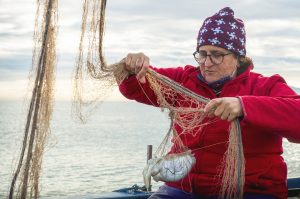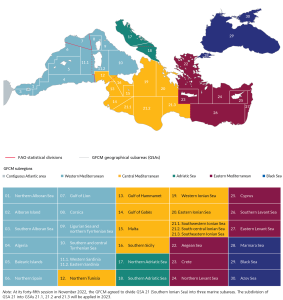Meaningful progress has been made in improving social protection coverage in the Mediterranean and Black Sea region, resulting in both better fisher resilience and fisheries management
This article is by Anna Carlson (anna.carlson@fao.org), Fishery Officer (Livelihoods), FishEBM Projects Manager, General Fisheries Commission for the Mediterranean (GFCM), Food and Agriculture Organization of the United Nations (FAO), Rome, Italy
Over the past decade, the importance of advancing social development for fishers in the Mediterranean and Black Sea region has become more prominent than ever. In particular, for the contracting parties and co-operating non-contracting parties (CPCs) of the General Fisheries Commission for the Mediterranean (GFCM), the extension of social protection coverage for fishers in the region has become an increasing priority. It has been recognized as an essential tool to enhance adaptive capacity and resilience of fishers, while contributing to the twin goals of improved livelihoods and sustainable fisheries management.
Discussions on supporting social protection for fishers have evolved over the last decade and the issue has steadily been reinforced through various political commitments. GFCM’s work on small-scale fisheries (SSF) has given impetus to these discussions. It builds on the principles of the Voluntary Guidelines for Securing Sustainable Small-Scale Fisheries in the Context of Food Security and Poverty Eradication (the SSF Guidelines) and the UN Sustainable Development Goals (SDGs), which call for an end to poverty by 2030 and extending social protection to reach the poor and vulnerable. GFCM adopted in 2018 a Regional Plan of Action for Small-Scale Fisheries in the Mediterranean and the Black Sea (RPOA-SSF); it set the goal of improving livelihoods in the region, and highlighted decent work and social protection as key components of future strategy.
GFCM has been supporting CPCs in developing capacities to conduct regular, up-to-date data collection that can also be used to inform accurate and efficient social protection design
But what is social protection and why is it pertinent to GFCM’s work? As a body of the Food and Agriculture Organization of the United Nations (FAO), GFCM follows FAO’s definition of social protection, namely, the set of policies and programmes that address economic, environmental and social vulnerabilities to food insecurity and poverty by protecting and promoting livelihoods. It is structured around three main categories: one, social insurance (that is, social security such as unemployment insurance, health insurance, old-age pensions, worker’s compensation and maternity leave); two, social assistance (that is, unconditional cash transfers, conditional cash transfers, school feeding programmes and food vouchers); and, three, social inclusion (that is, anti-discrimination measures for, say, disability, affirmative action campaigns for, say, ethnic minorities, and gender equality). FAO, through its work, aims to ensure that social protection systems are well integrated into broader livelihood-promotion and rural-development strategies. For its part, GFCM has taken up this charge, aiming to promote better coherence between fisheries management and social protection programming.
The region and its SSF profile
In the Mediterranean and Black Sea region, SSF play a vital role, accounting for 82 per cent of the region’s fishing fleet and 61 per cent of total onboard employment. In addition to their prominence, they also have particular characteristics that make social protection coverage of this sector particularly important. SSF in this region are considered a highly vulnerable population, with variable and unpredictable income characterized by high seasonality and fluctuations in catch and market prices. It is also a population with relatively low adaptive capacity, including limited savings and limited access to credit, educational resources and alternative livelihoods.

Their vulnerability is exacerbated by regular undervaluing of the sector’s contribution, particularly those from ‘invisible’ groups like women and gleaners, as well as by high exposure to risk. These risks take a number of forms:
The COVID-19 pandemic only served to further highlight the vulnerabilities of the sector—for both small-scale and industrial fishers alike—and drew the attention of administrations to the importance of extending social protection coverage for the sector.
In order to support GFCM members in better understanding the social protection needs in the region, including potential challenges and best practices, FAO and GFCM published a study in 2019. Titled ‘Social protection for small-scale fisheries in the Mediterranean region: A review’, it examined five diverse country case studies in the region. It identified challenges, examined best practices and made recommendations for extending coverage. The conclusions have formed the basis for GFCM’s work on promoting social protection coverage in recent years.
The FAO-GFCM study highlighted that most countries in the Mediterranean region have some form of basic social protection systems in place; fishers particularly valued access to healthcare and sickness benefits, unemployment benefits and old age pensions. However, the study identified a number of challenges fishers face in accessing and providing social protection programming for small-scale fishers. Often there is a poor fit between the conventional modalities of social security systems and the realities of the SSF sector. Conventional social protection programmes often have a need for regular contributions; fisheries, however, are characterized by seasonal work and irregular income.
Similarly, there is often a requirement for worker registration and recognition of fishing as a form of formal employment. These conditions are often lacking in a sector characterized by informal work arrangements, often operating without formal work contracts. Similarly, universal (non-contributory) social protection coverage is very limited in the region; there are often concerns about the affordability of extending provision to fishers and fishworkers due to fiscal challenges. Finally, the planning of social protection provision is hindered by a lack of up-to-date information about the size and socio-economic characteristics of the sector, which is typically data poor.
The study noted that conditions for successful social protection extension to the fisheries sector and, in particular, small-scale fisheries, included:
The commission’s work
To facilitate social protection provision in its region, GFCM has been working on a number of fronts. First, GFCM has been supporting CPCs in developing capacities to conduct regular, up-to-date data collection that can also be used to inform accurate and efficient social protection design. GFCM has also been driving efforts to raise awareness about vulnerable or ‘invisible’ segments of the fisheries sector, for example, gleaners and women. It is encouraging enhanced data collection to bring to light their contributions. To this end, GFCM recently published a study on the role of women in Mediterranean and Black Sea fisheries.
Finally, GFCM has been promoting complementary incentives between social protection and fisheries management, not only ensuring that data collection can support social protection planning, but also better linking social protection to fisheries management discussions, and encouraging fisheries managers to consider social protection as a tool to ensure good compliance with management decisions.

A concrete example of this is the GFCM-LEX database, a pioneering multilingual online platform that centralizes legal frameworks across countries in the Mediterranean and Black Sea region; it aims to bolster efforts in the fight against illegal, unreported and unregulated (IUU) fishing and foster the implementation of GFCM recommendations. This database now includes relevant social protection legislation applicable to the sector, helping to disseminate information about available programming, build synergies between relevant fisheries and social ministries, as well as identify gaps in coverage to be addressed.
Similarly, GFCM has been partnering with local SSF organizations, like the Tunisian Association for the Development of Artisanal Fisheries, to raise awareness among its members about their rights to social protection access and to help facilitate adherence to existing programming. Lastly, the GFCM has been partnering with FAO’s SocPro4Fish project that has been working in Tunisia to strengthen the resilience of fishworkers to cope with macro- and micro-level covariate impacts and shocks by increasing the understanding of the current scenario, reducing the barriers to access social protection, and promoting economic opportunities and better management of resources.
The efforts made to draw attention to the role of social protection for promoting both fisher resilience and fisheries management, as well as the efforts made to address challenges for provision and promoting best practices, has begun to show results. Meaningful progress has been made in improving social protection coverage in the Mediterranean and Black Sea region.
Since 2020, social protection coverage is steadily being extended. Health insurance coverage has been extended to fishers in an additional CPC (with 71 per cent of all CPCs now providing health insurance for fishers), old age pensions have been extended to fishers in an additional two CPCs (with 67 per cent of all CPCs now providing old age pensions for fishers) and unemployment benefits have now been extended to fishers in an additional three CPCs (with 38 per cent of CPCs now providing unemployment benefits for fishers). Although there is still work to be done, progress is being made in the right direction.
For more
The State of Mediterranean and Black Sea Fisheries 2023 – Special edition
https://openknowledge.fao.org/server/api/core/bitstreams/498fd9bf-7ab3-4c4b-8ddc-9405c2c3ed02/content
Social protection for small-scale fisheries in the Mediterranean region – A review
https://openknowledge.fao.org/server/api/core/bitstreams/677d1769-6909-49cc-abd3-ecb897acf170/content
Women in fisheries in the Mediterranean and Black Sea region: roles, challenges and opportunities
https://openknowledge.fao.org/bitstreams/e1957b62-4658-4232-bd95-9c64ab56bb46/download